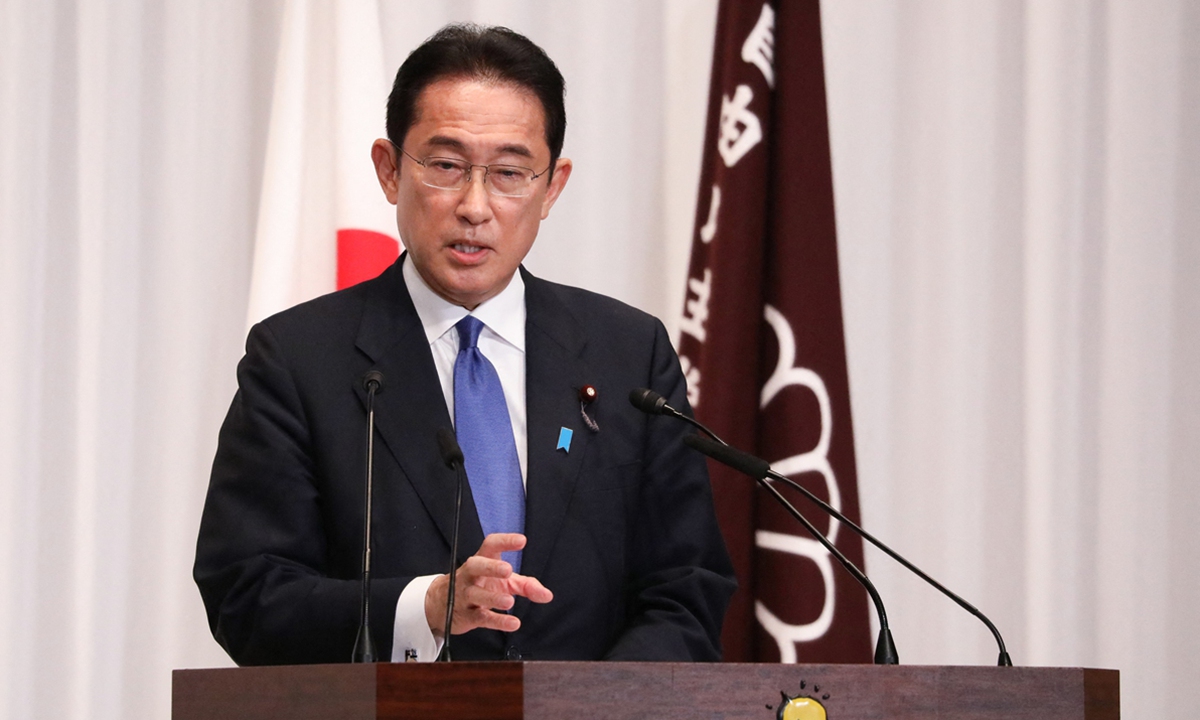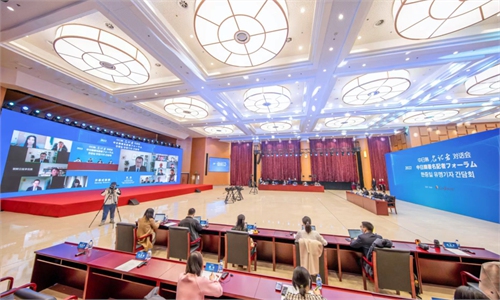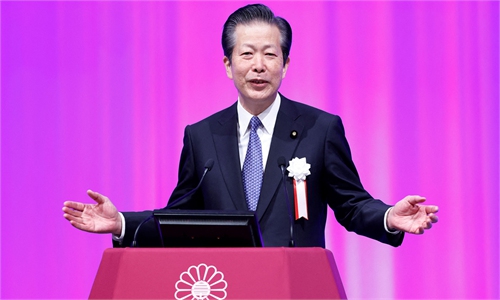Japan warned of being 'biggest destabilizing factor' in E.Asia as Kishida sets defense spending at 2% of GDP for 1st time

Fumio Kishida Photo: AFP
Considering Japan, a country with the pacifist constitution and claims to adhere on the path of peace, is eyeing to further arm itself, there is a big question mark hanging over the country's future whether it would repeat its historic mistakes, Chinese observers expressed deep concerns after Japanese Prime Minister Fumio Kishida on Monday ordered the defense budget to rise to two percent of gross domestic product (GDP) in fiscal 2027.
According to the Japan Times on Tuesday, Kishida has instructed his defense and finance chiefs to boost defense spending to two percent of GDP by 2027 - a target long sought by the ruling party but now referred to by Kishida as a specific budget figure for the first time.
"Instead of saying we can't do so due to the lack of financial resources, we need to come up with ways to secure the necessary funds swiftly," Japanese Defense Minister Yasukazu Hamada said at the meeting.
Japan has long capped its annual defense spending at about 1 percent of GDP, or 5 trillion yen ($36 billion). The Defense Ministry said that 48 trillion yen will be required for the next five years to improve the country's defense capabilities, Kyodo News reported, citing the concern over "China's growing military strength and North Korea's missile development."
Japan's decision of boosting its defense budget to 2 percent of its GDP over five years - a level on par with the military alliance NATO member states - comes as a growing hype over the "external security threats" in the narratives of the Japanese government, politicians and media in recent years especially since the Russia-Ukraine conflict, Da Zhigang, director of the Institute of Northeast Asian Studies at Heilongjiang Provincial Academy of Social Sciences, told the Global Times on Tuesday.
While describing the Ukraine crisis as a trigger which may have accelerated the decision to come, Da believes to raise the defense budget essentially targets China.
Recently, not only has the dispute between the two countries over the Diaoyu Islands intensified, but also tensions over the Taiwan question have been hyped by Japanese conservative forces, observers said. The hot-button issues have been used by the Japanese conservative forces to incite Japanese public concern over their external environment, which in turn made the whole society turning more right, observers said.
Lü Yaodong, a research fellow with the Institute of Japanese Studies under the Chinese Academy of Social Sciences, said previously the Japanese government was playing up the Russia-Ukraine conflict, changes in surrounding areas and in the international situation, and claiming to protect the "national security," which have laid the groundwork for increasing the defense budget. Now it seems that the budget increasing issue began to enter the implementation stage.
If the defense budget is increased to 2% of the GDP, other spending will have to be reduced. In addition, whether or not to raise taxes and what kind of taxes to raise are topics that Japan's ruling Liberal Democratic Party needs to discuss, Lü noted.
According to the Chinese version of Nikkei Shimbun on Tuesday, some politicians have put forward at the meeting on increasing defense spending that Japanese citizens should pay for the rising budget through a wide range of taxes. Some officials in the Japanese government argued that the government should raise funds by raising taxes such as corporate tax, income tax and tobacco tax, the report noted.
Although there could be many Japanese people opposing the decision since the decision is very likely to raise their taxes and increase their burden amid the country's highest inflation in decades, the opposition voices are more likely to be far from overturning the decision, said Da, noting this has exposed one of the biggest problems in the more conservative Japanese society.
On Saturday, Kyodo News cited a source familiar with the matter as saying that "Japan is considering using an enemy base strike capability, or what it prefers to call 'counterstrike capability,' with its ally the United States, in the event it comes under attack."
Both Kishida's order to an increase of the defense budget and the plan to use enemy base strike capability have come ahead of update of the National Security Strategy, Japan's long-term diplomacy and security policy guideline, and compile of the initial budget for fiscal 2023, which starts in April, by year-end, local media reported.
As Japanese media revealed recently that Kishida is considering making his first visit to the White House since he took office last year ahead of an ordinary session of the Diet, Japan's parliament, in January for talks with US President Joe Biden, Da said the Kishida's order to raise the defense budget and the plan to use enemy base strike capability with the US will serve as "a gift" to Biden during their first meeting in the White House.
As a country that waged wars of aggression during the World War II, restricted by its pacifist constitution, Japan begins to increase its defense capabilities, which will make the country to become the biggest destabilizing factor in the security environment in East Asia, Lü said.
"There is a big question mark hanging over the country which has claimed to be on the path of peace but tries to further arm itself again," Lü said.



